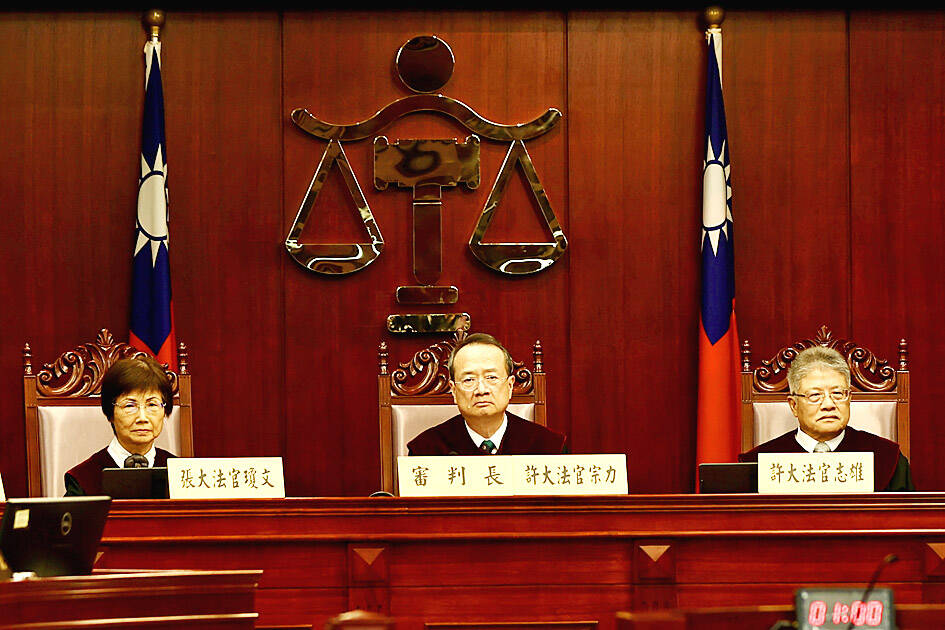The death penalty conforms with the Constitution, but should only be applied in “exceptional” cases, the Constitutional Court said yesterday.
The judgement was issued in response to a petition by prisoners on death row who said that capital punishment was unconstitutional.
“The death penalty is a capital punishment and its scope of application should still be limited to special and exceptional circumstances,” Chief Justice Hsu Tzong-li (許宗力) said during a lengthy readout of the court’s decision.

Photo: Ritchie B. Tongo, EPA-EFE
While the right to life is protected by the Constitution, “such protection is not absolute,” the court said in a statement.
“The court emphasized that because the death penalty is the most severe punishment and irreversible in nature, its application and procedural safeguards — from investigation to execution — should be reviewed under strict scrutiny,” it said in reference to the crime of murder.
However, “the judgement did not address the constitutionality of the death penalty in general or when imposed for other offenses,” such as treason or drug-related offenses, it said.
Imposing the death sentence is “prohibited” for “defendants with mental conditions, even if their mental conditions did not influence their offense in the cases in question,” the statement said.
Additionally, people on death row “should not be executed if they have a mental condition to an extent that impedes their competency for execution,” it said.
Democratic Progressive Party lawmakers yesterday affirmed the legality of capital punishment in the Criminal Code, adding that they would respect the court’s decision.
Chinese Nationalist Party (KMT) lawmakers criticized the ruling, saying “it effectively abolished capital punishment in Taiwan.”
The court’s decision runs contrary to the expectations of the majority of Taiwanese, they said.
Human rights advocates and groups opposed to capital punishment expressed disappointment with the Constitutional Court’s judgement, saying that government agencies had not pushed for a genuine decision on the issue.
“We shall keep up the fight. We hope that some day Taiwan will no longer have the death penalty,” they said in a statement.
“The Constitutional Court must be resolute in defending human rights by declaring the death penalty to be unconstitutional,” they said. “Then we can lead Taiwanese society forward to rise above hatred and using state violence as a deterrent.”
“It is time to break the cycle of taking lives and hatred to allow society to start the healing process,” the groups said. “It is unfortunate that the court did not do so.”
Taiwan Alliance to End the Death Penalty director Lin Hsin-yi (林欣怡) said that the government has not taken a firm stance on capital punishment because of divided public opinion on the issue.
However, DPP members are mainly in favor of abolishment, but they did not make an unequivocal statement to clarify their stance, Lin said.

The Ministry of Foreign Affairs (MOFA) yesterday said it is closely monitoring developments in Venezuela, and would continue to cooperate with democratic allies and work together for regional and global security, stability, and prosperity. The remarks came after the US on Saturday launched a series of airstrikes in Venezuela and kidnapped Venezuelan President Nicolas Maduro, who was later flown to New York along with his wife. The pair face US charges related to drug trafficking and alleged cooperation with gangs designated as terrorist organizations. Maduro has denied the allegations. The ministry said that it is closely monitoring the political and economic situation

Conflict with Taiwan could leave China with “massive economic disruption, catastrophic military losses, significant social unrest, and devastating sanctions,” a US think tank said in a report released on Monday. The German Marshall Fund released a report titled If China Attacks Taiwan: The Consequences for China of “Minor Conflict” and “Major War” Scenarios. The report details the “massive” economic, military, social and international costs to China in the event of a minor conflict or major war with Taiwan, estimating that the Chinese People’s Liberation Army (PLA) could sustain losses of more than half of its active-duty ground forces, including 100,000 troops. Understanding Chinese

UNRELENTING: China attempted cyberattacks on Taiwan’s critical infrastructure 2.63 million times per day last year, up from 1.23 million in 2023, the NSB said China’s cyberarmy has long engaged in cyberattacks against Taiwan’s critical infrastructure, employing diverse and evolving tactics, the National Security Bureau (NSB) said yesterday, adding that cyberattacks on critical energy infrastructure last year increased 10-fold compared with the previous year. The NSB yesterday released a report titled Analysis on China’s Cyber Threats to Taiwan’s Critical Infrastructure in 2025, outlining the number of cyberattacks, major tactics and hacker groups. Taiwan’s national intelligence community identified a large number of cybersecurity incidents last year, the bureau said in a statement. China’s cyberarmy last year launched an average of 2.63 million intrusion attempts per day targeting Taiwan’s critical

‘SLICING METHOD’: In the event of a blockade, the China Coast Guard would intercept Taiwanese ships while its navy would seek to deter foreign intervention China’s military drills around Taiwan this week signaled potential strategies to cut the nation off from energy supplies and foreign military assistance, a US think tank report said. The Chinese People’s Liberation Army (PLA) conducted what it called “Justice Mission 2025” exercises from Monday to Tuesday in five maritime zones and airspace around Taiwan, calling them a warning to “Taiwanese independence” forces. In a report released on Wednesday, the Institute for the Study of War said the exercises effectively simulated blocking shipping routes to major port cities, including Kaohsiung, Keelung and Hualien. Taiwan would be highly vulnerable under such a blockade, because it